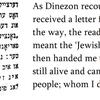4: Memoir excerpt, Yankev Dinezon as quoted in Isaac Rozentsvayg’s “The Radical Period of Peretz’s Career,” 1934, Yiddish with English translation.
In this anecdote, quoted in Der radikaler peryod fun peretses shafn: di yontif bletlekh (The Radical Period of Peretz’s Creative Career: The Holiday Magazines), one of Peretz’s contemporaries, fellow Yiddish writer Yankev Dinezon, recalls in his memoirs what happened when Peretz received a letter from a reader offering an interpretation of “Bontshe Shvayg.” Peretz rejects the reader's interpretation of whom Bontshe is meant to represent, saying, "Whom I did have in mind, you obviously know." It seems likely that he meant the poor—Peretz was, at that point in his career, a committed, radical socialist, and the story was originally published in New York's leftist Arbeter tsaytung (Workers' Paper).
Suggested activity: Read the anecdote aloud. If necessary, explain what a “Litvak” is (explanation of the stereotype may be found in this article from the YIVO Encyclopedia, especially the sixth paragraph). Ask students: if Peretz didn’t intend Bontshe to represent the “Jewish people,” what or whom do you think he did want Bontshe to represent? To give them some context for that question, you may wish to tell the students where the story was first published.
Sources: Yankev Dinezon, Y.l. perets. tsum yortsayt (I. L. Peretz, Upon the Anniversary of His Death) (Vilna: Vilner farlag fun b. a. kletskin (Vilna Press of B. A. Kletskin), 1916), 19, quoted in Isaac Rozentsvayg, Di radikaler period fun peretses shafn (Kharkiv, Ukrainian SSR: Melukhe-farlag far di natsionale minderheytn in fss’r (Government Press for Ethnic Minorities in the USSR, 1934), translation adapted from Adi Mahalel’s in The Radical Years of I. L. Peretz, doctoral dissertation (New York: Columbia University, 2014), 94.

